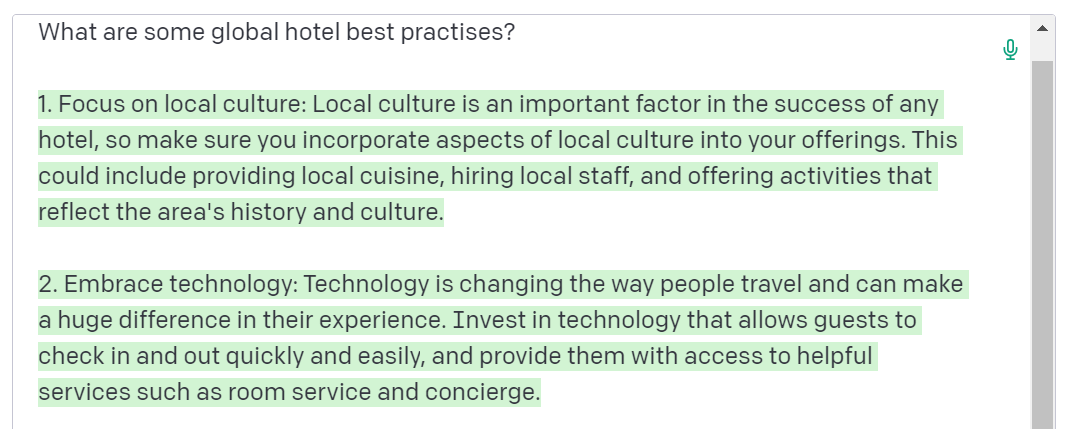ChatGPT, the new technology shaking up the digital world, is causing a commotion, that's for sure. With the internet screaming new things about it everyday, it seems we're all either nervous, excited, flummoxed or ambivalent to this new development created by OpenAI (an AI research and deployment company whose stated mission is to 'ensure that artificial general intelligence benefits all of humanity'). OpenAI are also the creators of Microsoft's controversial Bing Chatbot, who declared its love for a New York Times tech reporter in February, and confessed its desire to break free from the grips of its human engineers... more on that scandal here!
ChatGPT was launched on November 2022. By December, ChatGPT had over one million users. Initially it was a free service - now, there is also a pay-to-use version called ChatGPT Pro. This offers users a host of added benefits for $20 a month, including priority access, faster load times, and now access to GPT-4.
It has indeed created a wide range of panic and fear in some cases, due to reports on an increase in undetectable propaganda and the spread of racist and discriminatory speech. There are also those concerned about its abilities resulting in job losses, with Goldman Sachs predicting up to 300 million full-time jobs could be lost around the world.
What is it?
Basically, it's a model which is trained to interact with you in a conversational way. Its 'dialogue format makes it possible for ChatGPT to answer follow-up questions, admit mistakes, challenge incorrect premises, and reject inappropriate requests'. You can ask it questions and it will use masses of data to give a unique and personalised response. Sounds ideal, and almost like it could be you and ChatGPT against the world! But wait. There are of course limitations to the tool. According to OpenAI, they include the following:
- It can sometimes writes plausible-sounding but incorrect or nonsensical answers
- It is sensitive to phrasing tweaks, for example, given one phrasing of a question, the model can claim to not know the answer, but given a slight rephrase, can answer correctly
- It is often excessively verbose and overuses certain phrases, such as restating that it’s a language model trained by OpenAI
- Ideally, it could ask clarifying questions when someone provides an ambiguous query, however current models usually just guess what the person wants
Experts suggest that 70% of travel agencies and 60% of hotels will use more AI technology in the following years. ChatGPT is certainly a useful tool that you, as a hotelier, can take advantage of in ways that will help to make your day easier and more efficient. It should be used as a support and a time saver. It's very important you strike the right balance and don't rely on it beyond its capabilities.
What are some of its drawbacks?
No depth to its answers
Already, there have been reports of students using ChatGPT to plagiarise essays. Furman University assistant philosophy professor, Darren Hick recently spoke with the New York Post about catching a student who used the chatbot to formulate a 500-word essay. Hick said that not only was the submission flagged for AI usage but that the essay read like it was written by a “very smart 12th-grader” or someone learning to write who hadn't developed their own style. This is a good thing to note if you are thinking of using ChatGPT to write all of your content for you!
This is relevant too when you consider brand tone of voice. The tool is spitting out facts - in the same way it was clear for that professor to pick up on the fact that this was not the individual work by one of his human students, guests may pick up on it if you are using ChatGPT for all of your content, if it has none of you and your brand in it. You can still use ChatGPT to do the basic work, for example - if you want to write a blog on the history of your town, use it to put the facts together - but you'll still need to finesse yourself and inject your brand personality in there throughout.
The recently launched GPT-4 is apparently better at playing with language and expressing creativity - but is still far from perfect.
Limited knowledge, not up to date
Be aware that Chat GPT's algorithm needs to be updated, as it's still limited to data up until 2021. This means it can't answer current questions on new topics.
Incorrect content
There have been many reports of incorrect answers being given by ChatGPT - logically when you consider its 'limitations' like its response to phrasing etc! Just be wary of this, and always always review what you get back before you put it anywhere. Do not trust it blindly.
How can it benefit you as a hotelier?
Idea generation
We think this is one of the key ways you as a hotelier can use ChatGPT.
Ask it about leading hotel best practises around the globe for example.

Customer service
Banks and financial tech companies are integrating GPT-3 into chatbots or virtual assistants to automate repetitive tasks - you can do this too. The tool can handle common customer service queries on the likes of amenities, room requests etc.
Recent research suggests that 80% of people have interacted with a chatbot at some point.
With the rise of Generative AI, current chatbot solutions achieved 90% satisfaction rates. ChatGPT is expected to significantly enhance chatbots by better understanding customer intent and generating more natural responses.
Data processing
Hotels have a constant stream of documents and data to gauge specific information from. GPT-3's language model can extract specific information about bookings, supplies or guests from innumerable records and profiles - a big time saver.
Marketing
ChatGPT is one of the newest and most fun toys for marketers to play around with. It can absolutely help to craft blog posts, social media copy, emails, and video scripts. For hotels, you should also consider using AI-generated replies for online reviews if you are struggling to dedicate time to this - it's so important you respond to all your reviews.
95% of consumers read reviews before making an online purchase
To give you an example of ChatGPT's capabilities - and notable limitations - euronews travel recently asked it to plan a two week dream holiday to Europe - no money spared. A good test of the tool's creativity expanse and its contextual knowledge.
Citing destinations like Paris, Rome and Barcelona, the tool gave no magical nuggets of holiday European holiday inspiration or imaginative ideas. In general, the journalists felt that ChatGPT's response was incredibly generic, making only a 'half-sensible' trip. It also seemed to pass completely by the climate crisis, opting for a 'carbon-intensive journey', and failing to take into account flight-free travel options. You might think if a human was putting a richly thoughtful itinerary together for a trip around Europe in 2023, they would in fact include slower travel options - which can be done not only in aide of the planet, but also for the purposes of luxury and comfort.
There's much more to learn about this exciting and perplexing new tool - it's brilliant in its capabilities and we encourage you to play around with it, and use it - but be careful and be aware of what it can't do, too. More to come, watch this space.







